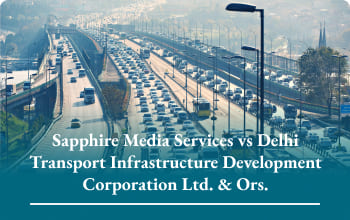
The Delhi High Court restrained DTIDC from
Employment & Services
The case of Raman Kumar & Ors. vs Union of India deals with the regularization of Group ‘D’ employees in the Income Tax Department. The Supreme Court had to determine whether the non regularization of certain employees, despite eligibility and prolonged service, was justified in the light of constitutional principles and prior precedents.
At the heart of the matter was whether the denial of regularization to a subset of employees, when others similarly placed were regularized, amounted to discrimination under Article 14 of the Constitution. The appeal arose from the dismissal of a contempt petition by the Patna High Court, which held that there was no contempt since posts were not available. The Supreme Court overruled this view and granted relief to the appellants.
Whether the Union of India had violated the constitutional guarantee of equality under Article 14 by regularizing only some eligible employees under the Uma Devi judgment’s one-time window, while denying regularization to others who were equally placed and had completed over ten years of service.
Additionally, whether the High Court was correct in dismissing a contempt petition, based solely on an affidavit citing the lack of vacancies, without examining the discriminatory application of the regularization policy.
Represented by senior advocates, the appellants argued:
The Union of India, represented by Additional Solicitor General Aishwarya Bhati, argued:
The Supreme Court rejected the government’s defense and made key observations:
The Supreme Court issued a clear and favourable ruling for the appellants:
The Government cannot pick and choose among similarly placed employees for regularization. Doing so is a clear breach of Article 14.
When a departmental report recognizes entitlement to regularization, eligible employees have a reasonable expectation of fairness.
The judgment clarifies that the High Court must look beyond technical compliance (e.g., filing an affidavit) and examine whether real constitutional violations have occurred.
The Court continues to apply the one-time window from Uma devi strictly but fairly, ensuring it is not selectively or unjustly applied.
Innovation
The Delhi High Court restrained DTIDC from invoking ₹1.71 crore bank guarantees under a void concession agreement, citing fraud and irretrievable injustice.
Learn More →Advisory
Delhi High Court appeal challenges the disputed will, citing denial of maintenance and questioning inheritance rights in Dr. Mahendra Prasad’s ₹40,000-crore estate.
Learn More →Innovation
The Supreme Court held that prolonged custody, without any substantial progress in trial proceedings, amounts to a violation of the fundamental right to personal liberty.
Learn More →Innovation
The Supreme Court held dissent is not defamation, critique is not sedition, and quashed the FIR against Vinod Dua, affirming free speech as democracy’s cornerstone.
Learn More →Advisory
The Delhi High Court, citing medical incapacity and asset risk, appointed an interim guardian to manage Mr. DMP’s ₹3,000-crore estate pending the guardianship dispute.
Learn More →Regulatory
Supreme Court sets aside NCDRC order as parties settle medical negligence dispute through ₹11 lakh humanitarian payment without admission of negligence.
Learn More →Advisory
The Delhi High Court dismissed Naresh Kumar Sharma’s plea but asked the Sports Ministry to review his discrimination claims against PCI’s selection process.
Learn More →Advisory
The Supreme Court regularizes services of long-serving Group ‘D’ employees, holding selective denial arbitrary and violative of Article 14.
Learn More →Advisory
Alok Kumar vs State of Bihar SC balances liberty with victim restitution through ₹13.94 Cr deposit condition.
Learn More →Advisory
Court holds merit cannot be sacrificed for technical lapses; disqualification for delayed submission of documents set aside.
Learn More →Advisory
Court weighs 7 years of custody, contradictory testimonies, and co-accused parity against gravity of murder charge in hanghai-30 bar brawl case.
Learn More →Advisory
Delhi Development Authority vs Tejpal Supreme Court rules that possession taken through memo and deposited compensation prevent lapse under Section 24(2) of the 2013 Act.
Learn More →This website is for informational purposes only and is not intended to advertise or solicit work as per the Bar Council of India rules. By accessing www.foresightlawoffices.com, you acknowledge that you are seeking information about Foresight Law voluntarily. Nothing on this site constitutes legal advice or creates a lawyer-client relationship. Foresight Law is not responsible for any actions taken based on the content here. External links do not imply endorsement. Please do not share confidential information via this website. For details, review our Privacy Policy and Terms of Use.
I Agree I Disagree